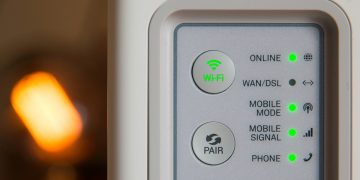If you’re dealing with Wi-Fi dead zones in your home, a Wi-Fi extender can be an affordable and effective solution. Wi-Fi extenders amplify the signal from your existing router, allowing you to enjoy a stronger and more reliable connection throughout your home. For those concerned about online privacy, integrating a VPN into your router can add an extra layer of security. By setting up ExpressVPN for your router, all devices connected to your Wi-Fi network will benefit from encrypted internet traffic, protecting your data from prying eyes.
Here’s a look at some of the best Wi-Fi extenders for 2024, categorized by different needs and preferences.
TP-Link RE705X: Best Overall Wi-Fi Extender
The TP-Link RE705X stands out as the best overall Wi-Fi extender. This plug-in extender is easy to set up and offers excellent performance thanks to its 160MHz data channels. It features a gigabit Ethernet port, making it versatile for connecting wired devices. The extender supports the latest Wi-Fi 6 technologies like MUMIMO and beamforming, which enhance speed and reliability. While slightly more expensive and prone to running hot, its performance and ease of use make it a top choice for most users.
Netgear Nighthawk AX8: Best for Ports
The Netgear Nighthawk AX8 is a great choice for those needing multiple ports. This standalone extender offers four gigabit Ethernet ports and a USB 3.0 port, which is ideal for connecting various devices. It is designed for high performance and supports 160MHz data channels and advanced Wi-Fi 6 technologies. Although larger and more expensive than most plug-in extenders, its port availability and robust performance justify the investment.
Linksys RE7310: Best for Range
The Linksys RE7310 excels at extending the range of your network. This plug-in extender features hidden antennas and Linksys’ Spot Finder technology, helping you find the optimal placement. It supports up to 20 devices simultaneously and uses Wi-Fi 6 technologies to improve speed and reliability. Despite lacking additional ports and being somewhat bulky, it offers good all-around performance and ease of setup.
Tenda A27: Best for Customization
For tech-savvy users, the Tenda A27 offers extensive customization options. It supports OFDMA, beamforming, and dual antennas for improved performance. The extender can function as both an extender and a wired access point, providing flexibility. However, it lacks a setup app and must be configured via a web browser. If customization and a three-year warranty are important, the Tenda A27 is a solid choice.
D-Link Eagle Pro AI E15: Best for Size
The D-Link Eagle Pro AI E15 is a compact option that uses AI to optimize data routing and reduce latency. This plug-in extender includes a gigabit Ethernet port and supports beamforming and MUMIMO technologies. While compact and affordable, its performance is not as strong as some other models. However, it is a practical and budget-friendly option for those with limited space.
NexusLink Wireless Gaming Bridge WB-1750: Best for Gamers
Tailored for gamers, the NexusLink Wireless Gaming Bridge WB-1750 is a wireless cable that connects Ethernet devices to your router. This ensures a stable and fast connection for gaming. The extender is easy to set up and offers a good range. Still, it requires two units for operation and needs an Ethernet connection at both ends. Despite being rather expensive, it provides excellent performance for gaming setups.
FAQs
What is a Wi-Fi extender?
A Wi-Fi extender amplifies the signal from your existing router, extending its range to cover areas with weak or no Wi-Fi signal.
How do I set up a Wi-Fi extender?
Most Wi-Fi extenders are easily set up using WPS (Wi-Fi Protected Setup). You typically press the WPS button on your router and the extender to pair them. Some models may require configuration via a web browser or mobile app.
Where should I place my Wi-Fi extender?
Place your Wi-Fi extender halfway between your router and the area with poor Wi-Fi coverage. Ensure it’s within the range of your router’s signal for optimal performance.
Do Wi-Fi extenders reduce speed?
Wi-Fi extenders can reduce speed because they split the bandwidth between the router and the connected devices. Dual-band extenders can help mitigate this by using separate bands for communication with the router and connected devices.
Is a mesh network better than a Wi-Fi extender?
Mesh networks provide more consistent coverage and seamless roaming across your home but are more expensive. Wi-Fi extenders are a more affordable solution for covering specific dead zones.
Choosing the right Wi-Fi extender depends on your specific needs, such as the range, number of ports, or customization options. With the options listed above, you can find a Wi-Fi extender that suits your requirements and improves your home network’s performance.
























